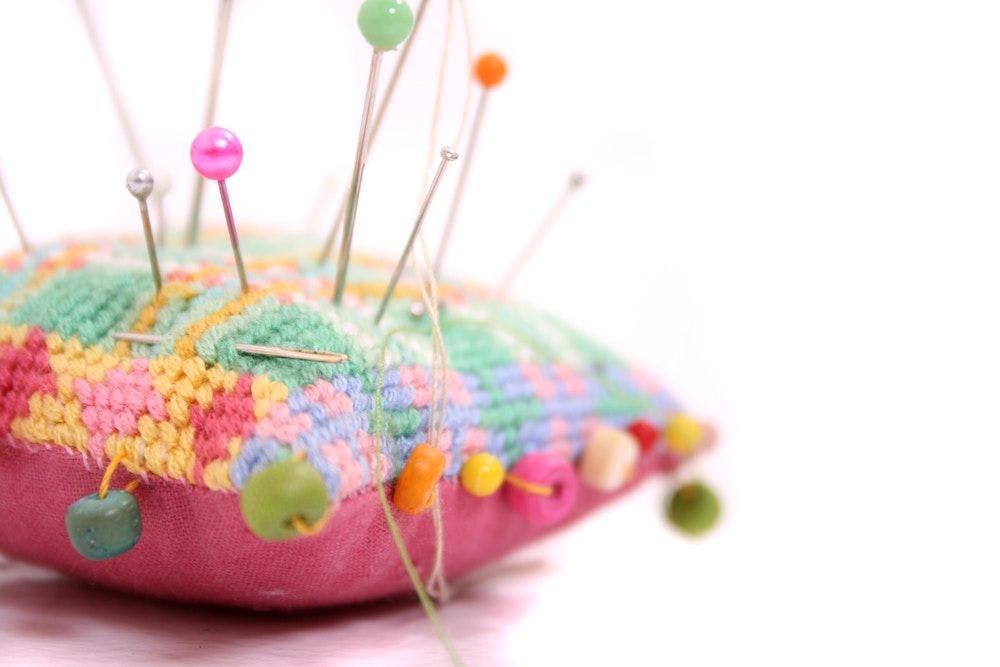
Unpicking the craft of needlework; how it can help you switch off, improve your mental health, make new friends – and even save the planet
Most of us can feel overwhelmed by the relentless demands of the digital world. Endlessly scrolling through social media, replying to emails, and checking apps, can make it difficult to switch off.
Mindful practices are a popular antidote to this. And sewing, as well as knitting, is increasingly recognised as an effective way to help with anxiety and depression.
The concentration these demand not only helps to calm the mind, but learning to repair clothing helps tackle the environmental impact of fast fashion, too. Here’s a quick look at why you might want to explore the world of needlework.
1. Sewing is mindful
Engaging in a mindful activity like sewing can help us pay attention to our thoughts and feelings, which can improve our mental health.
Creating something with your own hands provides a sense of accomplishment that can boost mental health
“Being creative is incredible for your wellbeing,” says Aliss Oxley, a sewing lover who set up the Workshop Sewing Cafe, in Leeds.
“It gives you an outlet to focus energy, but can also give you an enormous sense of accomplishment, which is a great way to support your mental health.
“People say sewing can be almost meditative. You concentrate on what you’re making, and the process of your construction,” she says. “It means your focus is solely on the activity of stitching.”
2. A distraction from negative thoughts
When you’re crafting, you’re giving your mind a break, too. One study, which introduced knitting to the lives of patients with anorexia, found 74% of participants described feeling distracted or distanced from negative emotional states, as well as more relaxed.
James McIntosh began to knit when he was struggling with depression. He recently wrote a book called Knit and Nibble, which explores knitting, cooking, and mindfulness.
“The fear, anxiety, panic and sadness, was too much. One day I found two chopsticks in my flat and some string, looked on YouTube, and started to cast on,” he says. “Before I knew it, I had knitted ‘something or other’.
“I noticed that each stitch became a breath, each breath a feeling, and the stitch was a tangible sign that my feelings were worth something, that I was worth something.”
3. A social activity
Loneliness has huge implications for our health, and social isolation is growing in the UK, with 2.4 million adults feeling lonely, according to the Office for National Statistics. Joining a sewing group – which you can often find on Facebook – is a good way to meet people.

Issy Woolford-Lim is an avid fan of needlecraft. “I go to a weekly group, which gives me social contact and encourages me to get out of the house, even when I’m down,” she says. “We’re all very positive and encouraging with each other, which I love.”
“Try to find your local haberdashery or fabric shop,” Aliss says. “The sewing community is incredibly friendly, and they should have some great advice to get started – from sewing meet-ups, to fabrics and patterns. They’ll point you in the right direction.”
4. A creative sense of achievement
Creating something with your own hands provides a sense of accomplishment that can boost mental health. In studies of people with depression and other chronic illnesses, textile crafts were found to increase self-esteem and improve the sense of wellbeing.
James struggled to find fashionable knitting patterns for men, so he started creating his own. “The first time I put on something I had knitted, I felt proud of myself again – an intimate and personal feeling,” he says. “I was knocked badly by homophobia in my native Northern Ireland, which triggered the depressive episode, and a stitch at a time helped me to realise that I was worth something.”
5. Fixing helps tackle fast fashion
Our clothes are fast, inexpensive, and mass-produced, which enforces cheap labour and generates a huge amount of pollution. Global textile production creates 1.2 billion tonnes of carbon emissions a year, according to research by the Ellen MacArthur Foundation – more than international flights and shipping. Repairing clothes instead of throwing them away can prevent fabric ending up as landfill, and lets you know you’re doing something positive to help our planet.

